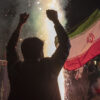Doug Bandow argues against NATO expansion on the basis that more friends mean more war. Does that mean that fewer friends will mean less war? Perhaps someone should tell President Obama that his great world apology tour, trying to win new friends and influence old ones, is not only displeasing to conservatives who believe in America’s exceptionalism, but also to the neo-isolationists.
There is no basis for thinking that if America withdraws from the world, then the world will let it live in splendid isolation. Withdrawing from the world would not have prevented 9/11, just as prematurely pulling out of Afghanistan would not increase U.S. or European security (and, in fact, increase their vulnerability).
The case for NATO expansion remains as strong today as it was in 1982 when Mr. Bandow’s boss – President Reagan – welcomed Spain into the alliance:
- Strategically, it makes sense. NATO’s 1995 Study on Enlargement concluded that expanding the alliance presented a ‘unique opportunity’ to increase Euro-Atlantic security and stability. Since democracies tend not to go to war with one another, building a club of freely- and fairly-elected stable powers with civilian control of the military is a pretty smart move.
- Tactically, it makes sense. International institutions – from the EU to NATO – are rules-based and values-based. Getting into them means countries have to play by rules and take on lengthy reform programs. In NATO, candidates have to complete a Membership Action Plan, which means more countries playing by the rules and more countries adopting values that America sees as important.
- Financially, it makes sense. Defense budgets have been in decline for some time, and nations therefore want more bang for their buck. NATO membership is a means to increase interoperability and build military-to-military relationships. Sure, America continues to take on a disproportionate (and unfair) share of NATO’s costs, but the alliance’s absence from Afghanistan would be far worse for the United States financially and strategically.
NATO expansion has been a success story for the alliance. Withdrawing the prospect of NATO accession from aspiring countries like Georgia and Ukraine throws away everything that the West won with the fall of the Berlin Wall 20 years ago. Giving de facto veto power to Russia over NATO enlargement equates to a geo-political victory for Moscow, a tacit acquiescence to its “zone of privileged interest” policy, which will see Russia dictate the military and political affairs of its border states. And America, in giving away this cookie, should expect others to demand a glass of milk. As Chamberlain found to his horror in 1939, less than a year after declaring ‘peace in our time,’ appeasement simply does not work.

























